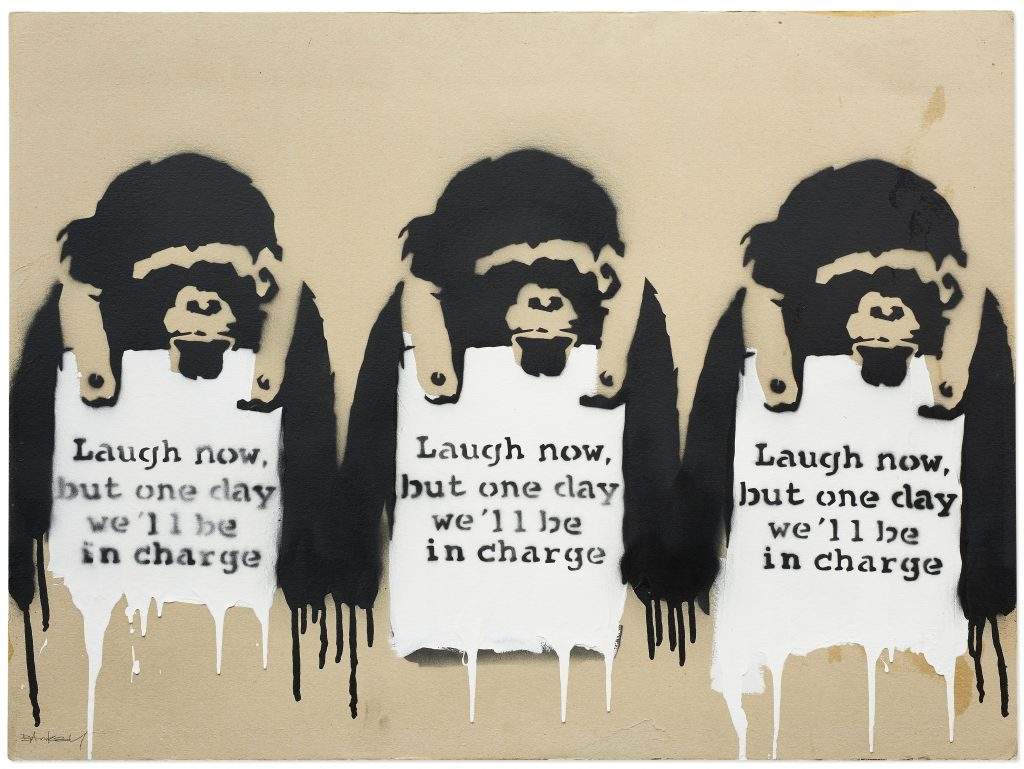Banksy has lost another legal battle over his trademark, following last September’s defeat, when he first lost his fight to have his trademark rights to one of his artworks recognized: theEuropean Union Intellectual Property Office (EUIPO), in a decision dated May 18, has once again proved him wrong. But let’s go in order: it all began three years ago, when a small British postcard company, Full Colour Black, used the image of Banksy’s famous Flower Thrower to produce a greeting card. Banksy’s work had been registered as a trademark in 2014, but Full Colour Black, in 2019, had requested formal cancellation of that trademark believing that it had been registered in bad faith, that is, not for commercial use: Banksy, in fact, never exploited its rights until October 2019, when he opened a store, called “Gross Domenstic Products,” to sell gadgets featuring his artwork, claiming that he was forced to do so in order to get possession of his trademark (European laws stipulate that the owner of a trademark cannot challenge its use by a third party if the presence of the same trademark has been tolerated for five consecutive years).
According to the EUIPO, however, the opening of the store had aggravated Banksy’s position because, according to the Office, this made it clear that Banksy had no intention of using the trademark when Pest Control Limited, i.e., the company that manages everything revolving around the British street artist (from authentications of works to exhibitions to merchandising), registered it in 2014: in practice, the store would have been opened only as an attempt not to lose the right to use the trademark.
The new clash, pitting Banksy and Full Colour Black against each other again, this time involves the famous chimpanzee in the work Laugh now, and the EUIPO has again “declared Banksy’s registered trademark invalid in its entirety.” The artist, according to the EUIPO, “has never made use of the trademark” and “Banksy has only reproduced the work as a work of art,” thus never having made commercial use of it for five years, which would preclude him from claiming rights to the trademark. Not only that, the EUIPO points out that Banksy himself allowed everyone to photograph his work and invited the public to download high-resolution photographs of his work so that everyone could create their own objects. In addition, the EUIPO even quotes Banksy’s book Wall and piece, where the artist himself states that “copyright is for losers” and that the public is morally and legally free to reproduce and use any work. “Banksy,” reads the EUIPO decision, “has known for years that his works were being widely photographed and reproduced on a massive and widespread scale, by a variety of third parties, without any commercial ties between them and Banksy. He also knew that specific goods and services for which he had obtained registration were included or included in items that were sold extensively and widely. Banksy does not use as a trademark any of the images he has registered, including the mark that is the subject of the lawsuit. His suit is part of a series of actions that constitute an attempt to monopolize images on an undefined basis, contrary to the rules of copyright law. Until recently, Banksy has never formally acted against anyone.”
Still, the EUIPO notes that Banksy “was not trying to carve out a part of the commercial market by selling his goods, but was simply trying to satisfy the categories of the trademark class to show the use of these goods in order to circumvent the non-use of the sign requirement under EU law.”
Another element in favor of Full Colour Black was recognized in the fact that Banksy has always chosen to conceal his identity. “It is noted,” the decision reads, “that Banksy has chosen to be anonymous and cannot be identified, which prevents him from being able to protect this artwork under copyright law, but identifying himself would bring down the confidentiality surrounding his public image and which has secured his fame and success.” As for ties to Pest Control Limited (the company in fact claims to be the artist’s legal representative), the EUIPO notes that “the evidence is not exhaustive and Banksy’s identity cannot be legally determined. Therefore, it would be quite difficult for Banksy to enforce his trademark rights against third parties.”
Lawyer Aaron Wood, representing Full Colour Black, told World Trademark Review, which has been following the case very closely, that he did not expect the European Union to cite Banksy’s derogatory comments about copyright, and especially that this new decision, “sounds the death knell for all Banksy’s trademarks, at least in the European Union, and raises the case in other countries as well. In the United States, for example, you have to produce a declaration of your intent to use a trademark, and the consequences of fraud are substantially heavier. I dare say that eventually finding out that Banksy is a fraudster will not be a good thing.” At the moment, five more European court cases are under way. And the outcome already appears to be a foregone conclusion.
 |
| Banksy loses another trademark battle: he himself says copyright is lame |
Warning: the translation into English of the original Italian article was created using automatic tools. We undertake to review all articles, but we do not guarantee the total absence of inaccuracies in the translation due to the program. You can find the original by clicking on the ITA button. If you find any mistake,please contact us.